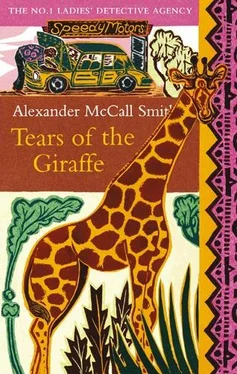Prison! What if Mma Ramotswe were to be sent to prison for a few years'? You can't marry somebody who is in prison, and they can't marry you. So if Mma Ramotswe were to be found to have committed a crime and be sent off for a few years, then all would stay exactly as it was. And did it really matter if she had not actually committed a crime, as long as the police thought that she had and they were able to find the evidence? She had heard once of how a man had been sent off to prison because his enemies had planted ammunition in his house and had informed the police that he was storing it for guerillas. That was back in the days of the Zimbabwe war, when Mr Nkomo had his men near Francistown and bullets and guns were coming into the country no matter how hard the police tried to stop them. The man had protested his innocence, but the police had just laughed, and the magistrate had laughed too.
There were few bullets and guns these days, but it might still be possible to find something that could be hidden in her house. What did the police look for these days? They were very worried about drugs, she believed, and the newspapers sometimes wrote about this person or that person being arrested for trading in dagga. But they had to have a large amount before the police were interested and where would she be able to lay her hands on that? Dagga was expensive and she could probably afford no more than a few leaves. So it would have to be something else.
The maid thought. A fly had landed on her forehead and was crawling down the ridge of her nose. Normally she would have brushed it away, but a thought had crossed her mind and it was developing deliciously. The fly was ignored: a dog barked in the neighbouring garden; a truck changed gear noisily on the road to the old airstrip. The maid smiled, and pushed her hat back. One of her men friends could help her. She knew what he did, and she knew that it was dangerous. He could deal with Mma Ramotswe, and in return she would give him those attentions which he so clearly enjoyed but which were denied him at home. Everybody would be happy. He would get what he wanted. She would save her job. Mr J.L.B. Matekoni would be saved from a predatory woman, and Mma Ramotswe would get her just deserts. It was all very clear.
THE MAID returned to the kitchen and started to peel some potatoes. Now that the threat posed by Mma Ramotswe was receding-or shortly would-she felt quite positively disposed towards her wayward employer, who was just weak, like all men. She would cook him a fine lunch today. There was meat in the fridge-meat which she had earlier planned to take home with her, but which she would now fry up for him with a couple of onions and a good helping of mashed potatoes.
The meal was not quite ready when Mr J.L.B. Matekoni came home. She heard his truck and the sound of the gate slamming, and then the door opening. He usually called out when he came back-a simple "I'm home now" to let her know that she could put his lunch on the table. Today, though, there was no shout; instead, there was the sound of another voice. She caught her breath. The thought occurred to her that he might have come home with that woman, having asked her to lunch. In that case, she would hurriedly hide the stew and say that there was no food in the house. She could not bear the thought of Mma Ramotswe eating her food; she would rather feed it to a dog than lay it before the woman who had threatened her livelihood.
She moved towards the kitchen door and peered down the corridor. Just inside the front door, holding it open to let somebody follow him into the house, was Mr J.L.B. Matekoni. "Careful," he said. "This door is not very wide." Another voice answered, but she did not hear what it said. It was a female voice but not, she realised with a rush of relief, the voice of that terrible woman. Who was he bringing back to the house? Another woman? That would be good, because then she could tell that Ramotswe woman that he was not faithful to her and that might put an end to the marriage before it started.
But then the wheelchair came in and she saw the girl, pushed by her small brother, enter the house. She was at a loss what to think. What was her employer doing bringing these children into the house? They must be relatives; the children of some distant cousin. The old Botswana morality dictated that you had to provide for such people, no matter how distant the connection.
"I am here, Rra," she called out. "Your lunch is ready."
Mr J.L.B. Matekoni looked up. "Ah," he said. "There are some children with me. They will need to eat."
"There will be enough," she called out. "I have made a good stew."
She waited a few minutes before going into the living room, busying herself with the mashing of the overcooked potatoes. When she did go though, wiping her hands industriously on a kitchen rag, she found Mr J.L.B. Matekoni sitting in his chair. On the other side of the room, looking out of the window, was a girl, with a young boy, presumably her brother, standing beside her. The maid stared at the children, taking in at a glance what sort of children they were. Basarwa, she thought: unmistakable. The girl had that colour skin, the light brown, the colour of cattle dung; the boy had those eyes that those people have, a bit like Chinese eyes, and his buttocks stuck out in a little shelf behind him.
"These children have come to live here," said Mr J.L.B. Matekoni, lowering his eyes as he spoke. "They are from the orphan farm, but I am going to be looking after them."
The maid's eyes widened. She had not expected this. Masarwa children being brought into an ordinary person's house and allowed to live there was something no self-respecting person would do. These people were thieves-she never doubted that-and they should not be encouraged to come and live in respectable Batswana houses. Mr J.L.B. Matekoni may be trying to be kind, but there were limits to charity.
She stared at her employer. "They are staying here? For how many days?"
He did not look up at her. He was too ashamed, she thought.
"They are staying here for a long time. I am not planning to take them back."
She was silent. She wondered whether this had something to do with that Ramotswe woman. She might have decided that the children could come and stay as part of her programme to take over his life. First you move in some Masarwa children, and then you move in yourself. The moving in of the children may even have been part of a plot against herself, of course. Mma Ramotswe might well have expected that she would not approve of such children coming into the house and in this way she might force her out even before she moved in altogether. Well, if that was her plan, then she would do everything in her power to thwart it. She would show her that she liked these children and that she was happy to have them in the house. It would be difficult, but she could do it.
"You will be hungry," she said to the girl, smiling as she spoke. "I have some good stew. It is just what children like."
The girl returned the smile. "Thank you, Mma," she said respectfully. "You are very kind."
The boy said nothing. He was looking at the maid with those disconcerting eyes, and it made her shudder inwardly. She returned to the kitchen and prepared the plates. She gave the girl a good helping, and there was plenty for Mr J.L.B. Matekoni. But to the boy she gave only a small amount of stew, and covered most of that with the scrapings from the potato pot. She did not want to encourage that child, and the less he had to eat the better.
The meal was taken in silence. Mr J.L.B. Matekoni sat at the head of the table, with the girl at his right and the boy at the other end. The girl had to lean forward in her chair to eat, as the table was so constructed that the wheelchair would not fit underneath it. But she managed well enough, and soon finished her helping. The boy wolfed down his food and then sat with his hands politely clasped together, watching Mr J.L.B. Matekoni.
Читать дальше









